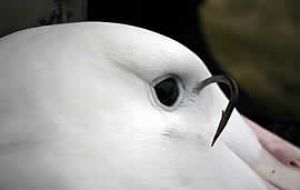MercoPress. South Atlantic News Agency
Shocking results from albatross survey at Bird Islands
 Adult wanderer with a hook through its eye socket
Adult wanderer with a hook through its eye socket DESPITE the achievements of the well managed South Georgia longline fishery, which has succeeded in reducing mortality of seabirds to almost zero, a new diet sampling programme at Bird Island has highlighted the shocking extent of longline hook ingestion by wandering albatrosses.
More than fifty per cent of wanderer chicks surveyed were found to have ingested longline hooks, fed to them by their parents. Robin Snape, British Antarctic Survey(BAS) Zoological Field Assistant at Bird Island, reports on his worrying find: "In winter, when the other albatross species have long since left the island, much of my fieldwork focuses on wandering albatrosses. Every fortnight I take diet samples from five different chicks as part of a study focused on squid, the most important part of the wandering albatross diet." "After a sample is taken, the chick (which is only handled once) is re-fed and monitored throughout the season. Previous studies indicate that one-off diet sampling in this way has no effect on chick fledging weight or survival, but provides a wealth of information on foraging ecology that would otherwise be impossible to obtain. By looking at the squid beaks found in the diet samples we can tell the species, size and the number of squid that are needed for the birds to be successful in raising their chicks. Mr Snape has discovered that over half of the chicks diet samples contain large hooks from longline fisheries, usually with small pieces of line attached. These are most likely to have been consumed in discarded bait and offal thrown overboard by longline vessels, which the adult birds routinely follow at sea. The hooks are then brought back and fed to the chick along with the other food. In 2004 the Commission for the Conservation of Antarctic Marine Living Resources (CCAMLR) made removal of hooks from offal mandatory and although compliance has taken some time to achieve, discard of hooks is now considered to be rare in CCAMLR waters. On the basis of his findings, Mr Snape concludes that the practice of irresponsibly discarding hooks in used bait may be typical of poorly governed fisheries elsewhere and continues:- "It is also likely that the vessels responsible are not employing other simple, cheap, and effective methods that help protect seabirds". In South Georgia's regulated fishery the effectiveness of simple practices such as greater line weighting, only setting lines at night and the use of a streamer or tori line that discourages scavenging birds from coming close to the longlines during setting, has been clearly demonstrated. Sadly, wandering albatrosses forage far outside of the South Georgia area and come into conflict with bad fishing practices that are responsible for the continuing decline in the South Georgia population, and the decline of seabird populations worldwide. The Bird Island population has almost halved since the early 1970s when longline fishing really began to operate at large-scale in the Southern Ocean and recently the rate of decline has accelerated. At the end of each season, shortly before the wanderer chicks fledge, they regurgitate pellets of squid beaks and other indigestible parts of the diet; amongst these we frequently find hooks and line. Mr Snape said every season the number of these fishing items found in the pellets is recorded. Towards the turn of the century the number of hooks found per season peaked but fell thereafter until last season (2006) when, disappointingly, the number rose again to very high levels. This season looks to be equally as bad, if not worse, he added. "As well as all the hooks in the chick diet samples, this year we have found two adult birds, one of which had a hook exiting through its eye socket and the other had a hook piercing its tongue and exiting through the throat" Mr Snape said. These injuries could easily have been fatal but the hooks were removed successfully. "Clearly many birds must die from their injuries at sea and so will never be accounted for other than in the declining population level", he concluded. Penguin News




Top Comments
Disclaimer & comment rulesCommenting for this story is now closed.
If you have a Facebook account, become a fan and comment on our Facebook Page!